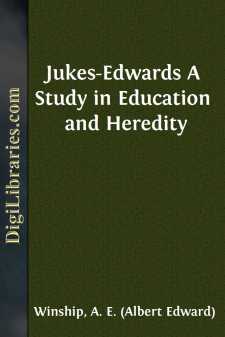Categories
- Antiques & Collectibles 13
- Architecture 36
- Art 48
- Bibles 22
- Biography & Autobiography 813
- Body, Mind & Spirit 142
- Business & Economics 28
- Children's Books 15
- Children's Fiction 12
- Computers 4
- Cooking 94
- Crafts & Hobbies 4
- Drama 346
- Education 46
- Family & Relationships 57
- Fiction 11829
- Games 19
- Gardening 17
- Health & Fitness 34
- History 1377
- House & Home 1
- Humor 147
- Juvenile Fiction 1873
- Juvenile Nonfiction 202
- Language Arts & Disciplines 88
- Law 16
- Literary Collections 686
- Literary Criticism 179
- Mathematics 13
- Medical 41
- Music 40
- Nature 179
- Non-Classifiable 1768
- Performing Arts 7
- Periodicals 1453
- Philosophy 64
- Photography 2
- Poetry 896
- Political Science 203
- Psychology 42
- Reference 154
- Religion 513
- Science 126
- Self-Help 84
- Social Science 81
- Sports & Recreation 34
- Study Aids 3
- Technology & Engineering 59
- Transportation 23
- Travel 463
- True Crime 29
Jukes-Edwards A Study in Education and Heredity
Categories:
Description:
Excerpt
THE JUKES
Education is something more than going to school for a few weeks each year, is more than knowing how to read and write. It has to do with character, with industry, and with patriotism. Education tends to do away with vulgarity, pauperism, and crime, tends to prevent disease and disgrace, and helps to manliness, success and loyalty.
Ignorance leads to all those things that education tries to do away with, and it tends to do away with all the things that education tries to cultivate. It is easy to say these things, and every one knows they are true, but few realize how much such statements mean. It is not easy to take a view of such matters over a long range of time and experience.
A boy that leaves school and shifts for himself by blacking boots, selling papers, and "swiping" fruit often appears much smarter than a boy of the same age who is going to school all the time and does not see so much of the world. A boy of twelve who has lived by his wits is often keener than a boy of the same age who has been well brought up at home and at school, but such a boy knows about as much and is about as much of a man at twelve as he will ever be, while the boy that gets an education becomes more and more of a man as long as he lives.
But this might be said a thousand times to every truant, and it would have very little effect, because he thinks that he will be an exception. He never sees beyond his own boyish smartness. Few men and women realize how true it is that these smart rascally fellows, who persist in remaining in ignorance, are to be the vicious, pauper, criminal class who are to fill the dens of vice, the poorhouses, and the prisons; who are to be burglars, highwaymen, and murderers. In place of opinions, it is well sometimes to present facts so clear and definite that they cannot be forgotten.
R.A. Dugdale, of New York State, began the study of "The Jukes" family in 1874, and in 1877 in the twentieth annual report of the New York Prison Commission he made a statement of the results. [Footnote: G.P. Putnam's Sons, New York, reprinted this study in "The Jukes."] This brief summary of "the Jukes" is based upon the facts which Mr. Dugdale has published.
"The Jukes" is a name given to a large family of degenerates. It is not the real name of any family, but a general term applied to forty-two different names borne by those in whose veins flows the blood of one man. The word "jukes" means "to roost." It refers to the habit of fowls to have no home, no nest, no coop, preferring to fly into the trees and roost away from the places where they belong. The word has also come to mean people who are too indolent and lazy to stand up or sit up, but sprawl out anywhere. "The Jukes" are a family that did not make good homes, did not provide themselves with comforts, did not work steadily. They are like hens that fly into the trees to roost.
The father of "The Jukes" Mr. Dugdale styled "Max." He was born about 1720 of Dutch stock. Had he remained with his home folk in the town and been educated, and thrifty like the rest of the boys, he might have given the world a very different kind of family from "The Jukes."
Max was a jolly good fellow and not very bad....


